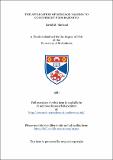Files in this item
The application of message passing to concurrent programming
Item metadata
| dc.contributor.advisor | Cole, A. J. (Alfred John) | |
| dc.contributor.author | Harland, David M. | |
| dc.coverage.spatial | 173 p. | en_US |
| dc.date.accessioned | 2018-05-21T13:50:21Z | |
| dc.date.available | 2018-05-21T13:50:21Z | |
| dc.date.issued | 1981 | |
| dc.identifier.uri | https://hdl.handle.net/10023/13425 | |
| dc.description.abstract | The development of concurrency in computer systems will be critically reviewed and an alternative strategy proposed. This is a programming language designed along semantic principles, and it is based upon the treatment of concurrent processes as values within that language's universe of discourse. An asynchronous polymorphic message system is provided to enable co-existent processes to communicate freely. This is presented as a fundamental language construct, and it is completely general purpose, as all values, however complex, can be passed as messages. Various operations are also built into the language so as to permit processes to discover and examine one another. These permit the development of robust systems, where localised failures can be detected, and action can be taken to recover. The orthogonality of the design is discussed and its implementation in terms of an incremental compiler and abstract machine interpreter is outlined in some detail. This thesis hopes to demonstrate that message-oriented communication in a highly parallel system of processes is not only a natural form of expression, but is eminently practical, so long as the entities performing the communication are values in the language | en_US |
| dc.language.iso | en | en_US |
| dc.publisher | University of St Andrews | |
| dc.subject.lcc | QA76.6H2 | |
| dc.subject.lcsh | Computer progamming. | en |
| dc.title | The application of message passing to concurrent programming | en_US |
| dc.type | Thesis | en_US |
| dc.contributor.sponsor | Science Research Council (Great Britain) | en_US |
| dc.type.qualificationlevel | Doctoral | en_US |
| dc.type.qualificationname | PhD Doctor of Philosophy | en_US |
| dc.publisher.institution | The University of St Andrews | en_US |
This item appears in the following Collection(s)
Items in the St Andrews Research Repository are protected by copyright, with all rights reserved, unless otherwise indicated.

